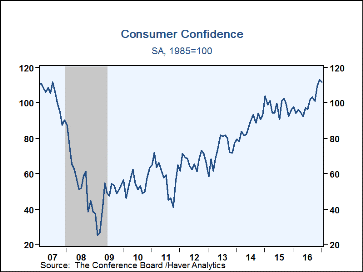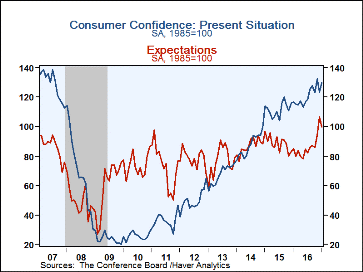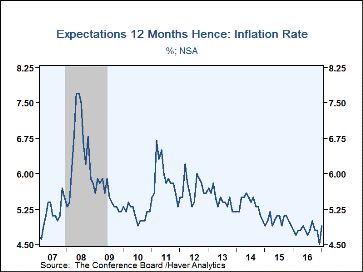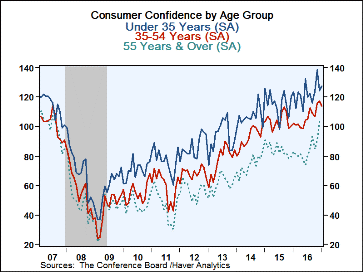 Global| Jan 31 2017
Global| Jan 31 2017U.S. Consumer Confidence Backs Off
by:Tom Moeller
|in:Economy in Brief
Summary
The Conference Board Index of Consumer Confidence indicated that its headline consumer confidence index for January declined to 111.8, following its December rise to a 15-year high. Also, December's reading was revised down slightly [...]
The Conference Board Index of Consumer Confidence indicated that its headline consumer confidence index for January declined to 111.8, following its December rise to a 15-year high. Also, December's reading was revised down slightly to 113.3 from 113.7. The Action Economics Forecast Survey had looked for a modest decline to 113.0 in January. During the past thirty years, there has been a 70% correlation between the level of consumer confidence and the y/y change in real PCE.
The decline in confidence in January was due to a weakened expectations index which fell to 99.8 following a December surge to 106.4. The present situation reading strengthened to 129.7 and made up much of the prior month's decline to 123.5.
Respondents indicating that business conditions are "good" improved slightly to 29.2%, while those saying business conditions are "bad" fell to 16.1%. Respondents stating that jobs are "plentiful" increased to 27.4%, while those claiming jobs are "hard to get" fell to 21.5%. This change in views on labor market conditions led to a modest increase in the labor market differential (a reliable indicator of the unemployment rate) to 5.9 percentage points from 3.3 percentage points in January and was close to the high for the current expansion.
In contrast to consumers' views on the current environment, their outlook for both business and labor market conditions backpedaled following December's rise. The percentage expecting business conditions to improve over the next six months fell to 23.1% following a surge to 24.7 in December. For labor markets, the percentage expecting more jobs in the months ahead fell to 19.8% following a December jump. And the percentage of consumers expecting their incomes to rise fell to 18.0% and reversed virtually all of its December rise to 21.5%.
Expectations for the inflation rate in 12 months jumped to 4.9%, the highest level since September. Moreover, consumers are looking for more interest rate increases. The percentage expecting higher interest rates over the next twelve months surged to 72.2%, the highest reading in 12 months and a marked increase from 52.3% six months ago.
Deterioration in the headline index was due mostly to lessened optimism amongst the 35-54 years age group. Confidence among individuals over aged 55 slipped. Respondents under age 35 registered slightly improved confidence following a sharp December retrenchment.
The Consumer Confidence data is available in Haver's CBDB database. The total indexes appear in USECON, and the market expectations are in AS1REPNA
| Conference Board (SA, 1985=100) | Jan | Dec | Nov | Y/Y % | 2016 | 2015 | 2014 |
|---|---|---|---|---|---|---|---|
| Consumer Confidence Index | 111.8 | 113.3 | 109.4 | 14.3 | 99.8 | 98.0 | 86.9 |
| Present Situation | 129.7 | 123.5 | 132.0 | 11.2 | 120.6 | 111.7 | 87.4 |
| Expectations | 99.8 | 106.4 | 94.4 | 17.0 | 86.1 | 88.8 | 86.6 |
| Consumer Confidence By Age Group | |||||||
| Under 35 Years | 127.3 | 124.4 | 138.5 | 2.9 | 122.4 | 116.0 | 106.6 |
| Aged 35-54 Years | 113.9 | 117.0 | 116.0 | 11.6 | 106.2 | 103.9 | 92.4 |
| Over 55 Years | 102.1 | 103.7 | 90.7 | 22.9 | 84.6 | 84.1 | 73.8 |
Tom Moeller
AuthorMore in Author Profile »Prior to joining Haver Analytics in 2000, Mr. Moeller worked as the Economist at Chancellor Capital Management from 1985 to 1999. There, he developed comprehensive economic forecasts and interpreted economic data for equity and fixed income portfolio managers. Also at Chancellor, Mr. Moeller worked as an equity analyst and was responsible for researching and rating companies in the economically sensitive automobile and housing industries for investment in Chancellor’s equity portfolio. Prior to joining Chancellor, Mr. Moeller was an Economist at Citibank from 1979 to 1984. He also analyzed pricing behavior in the metals industry for the Council on Wage and Price Stability in Washington, D.C. In 1999, Mr. Moeller received the award for most accurate forecast from the Forecasters' Club of New York. From 1990 to 1992 he was President of the New York Association for Business Economists. Mr. Moeller earned an M.B.A. in Finance from Fordham University, where he graduated in 1987. He holds a Bachelor of Arts in Economics from George Washington University.
More Economy in Brief
 Global| Feb 05 2026
Global| Feb 05 2026Charts of the Week: Balanced Policy, Resilient Data and AI Narratives
by:Andrew Cates










